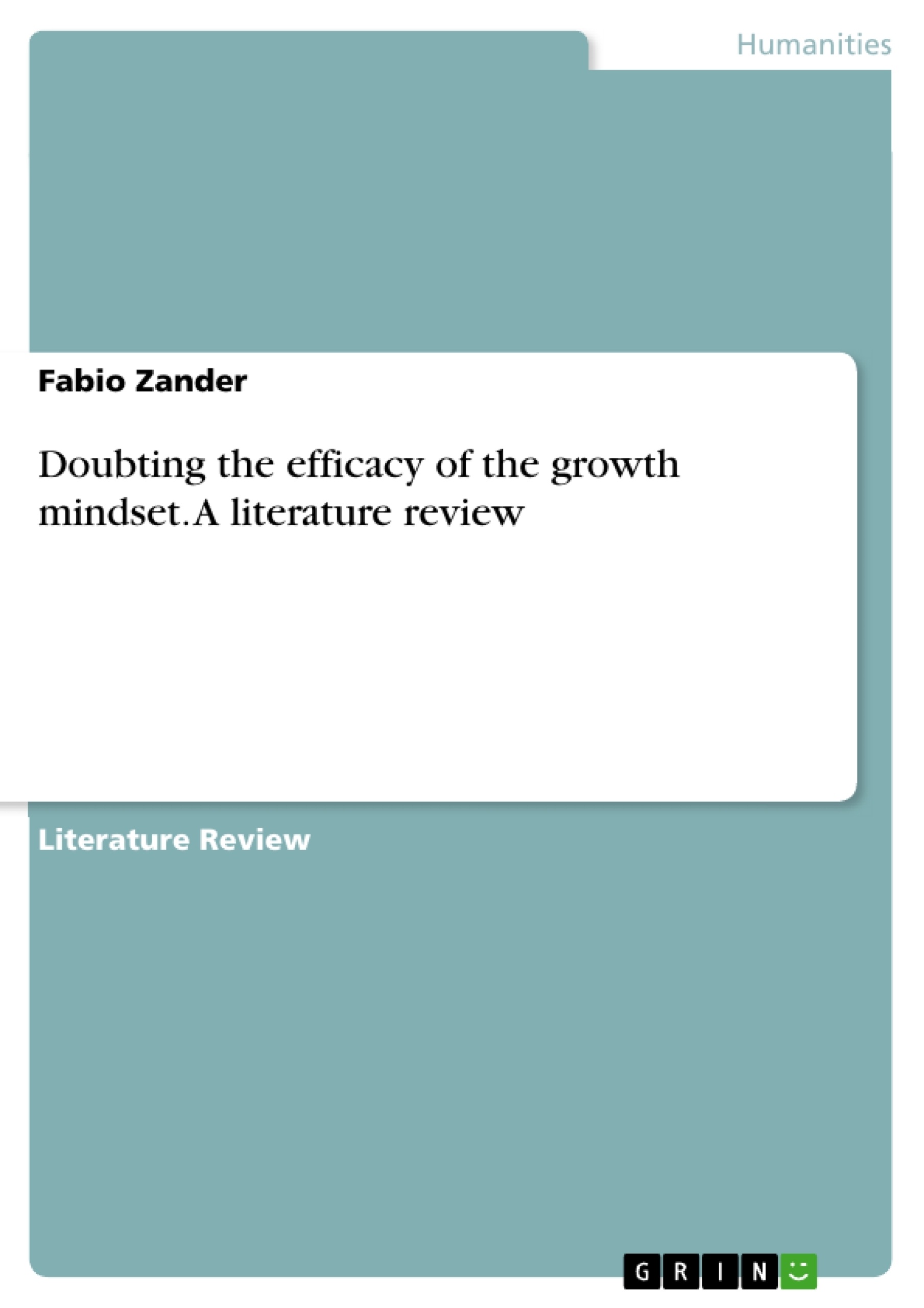The concept of the growth mindset has become better known over the last years and is presented as an important key factor determining failure and success (Dweck, 2006). This paper evaluates the current research on Dweck’s mindset theory as well as its scientific foundation. The main goal of this paper is to critically review the concept of the growth mindset and rate its status appropriately. By taking a closer look at the used methods and statistical inferences, the paper reassesses the science behind the growth mindset and discusses if its application has gone beyond the data.
It ascertains an existing discrepancy in the literature regarding the efficacy of mindset intervention and concludes that mindset interventions can be helpful and effective, however not to the degree as pledged. The growth mindset remains an interesting phenomenon which needs future research to clarify if it is benificial at all, and if so under which conditions. With regard to the current replication crisis, Dweck’s research serves as a good example which needs replication, using proper statistical methods and interpretation.
Inhaltsverzeichnis (Table of Contents)
- Growth and fixed mindset
- Mindset everywhere
- The foundation of growth mindset
- Mindset predicts academic achievement
- Meta-analysis and larger sample sizes needed
- A new mindset intervention
- Mindset's role in the replication crisis
- Replication attempt in China
- Replication attempt in Norway
- Discussion
- References
Zielsetzung und Themenschwerpunkte (Objectives and Key Themes)
This paper provides a critical review of the growth mindset concept and its scientific foundation. It aims to evaluate the current research on Dweck's mindset theory, particularly focusing on the methods and statistical inferences used. The paper also investigates the discrepancy in the literature concerning the efficacy of mindset interventions and examines the role of the growth mindset within the current replication crisis.
- The scientific foundation of the growth mindset
- The efficacy of mindset interventions
- The role of the growth mindset in the replication crisis
- The impact of mindset on academic achievement
- The importance of larger sample sizes and meta-analyses in research
Zusammenfassung der Kapitel (Chapter Summaries)
- Growth and fixed mindset: This chapter introduces the core concepts of growth and fixed mindsets, highlighting the beliefs and behaviors associated with each. It outlines the key differences between the two mindsets, particularly regarding their perception of intelligence, effort, and challenges.
- Mindset everywhere: This chapter explores the widespread adoption and application of the growth mindset across various domains, including education, business, and popular culture. It examines examples of how the growth mindset has been embraced by individuals, organizations, and even celebrities, emphasizing its growing influence.
- The foundation of growth mindset: This chapter delves into the seminal research that laid the foundation for Dweck's mindset theory. It examines the study by Mueller and Dweck (1998) that investigated the impact of praise for intelligence versus effort on children's motivation and performance. The chapter critically analyzes the study's methodology, statistical interpretations, and implications for the growth mindset concept.
- Mindset predicts academic achievement: This chapter discusses the research by Blackwell, Trzesniewski, and Dweck (2007) that investigated the longitudinal effects of a mindset intervention on 7th graders. It explores the relationship between implicit theories of intelligence and academic performance, emphasizing the potential impact of mindset interventions.
- Meta-analysis and larger sample sizes needed: This chapter addresses the limitations of previous research on the growth mindset and highlights the need for meta-analyses and larger sample sizes. It argues that these approaches are crucial to ensure the robustness and generalizability of research findings.
- A new mindset intervention: This chapter explores a novel mindset intervention designed to promote growth mindset beliefs and behaviors. It discusses the rationale, implementation, and potential benefits of this intervention, highlighting its implications for educational and personal development.
Schlüsselwörter (Keywords)
The core concepts and terms of this paper include: mindset, growth mindset, fixed mindset, academic achievement, replication crisis, mindset intervention, statistical inference, meta-analysis, sample size, and praise for effort versus ability.
Frequently Asked Questions
What is the difference between a growth and a fixed mindset?
A growth mindset is the belief that intelligence can be developed through hard work and strategies, while a fixed mindset assumes that intelligence is a static, unchangeable trait.
What does the research say about the efficacy of mindset interventions?
Current literature shows a discrepancy; while interventions can be helpful, they often do not achieve the high degree of success originally promised by early studies.
How does the growth mindset relate to the replication crisis?
Dweck's research serves as an example of studies that need rigorous replication using larger sample sizes and improved statistical methods to prove their robustness.
Does praising effort always lead to a growth mindset?
Seminal research by Mueller and Dweck suggests that praising effort rather than innate ability fosters motivation, but modern reviews call for a more nuanced interpretation of these data.
Why are meta-analyses important in mindset research?
Meta-analyses combine results from many studies to provide a more reliable and generalizable conclusion about whether mindset interventions actually predict academic achievement.
- Citation du texte
- Fabio Zander (Auteur), 2017, Doubting the efficacy of the growth mindset. A literature review, Munich, GRIN Verlag, https://www.grin.com/document/366433



